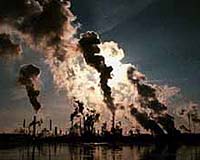| . |  |
. |
Cancun, Mexico (AFP) Dec 2, 2010 A feud over the Kyoto Protocol has cast a cloud over talks on future climate action, with Japan putting its foot down and refusing to extend the treaty named for its ancient capital. With negotiations in Cancun, Mexico, making little headway on a post-Kyoto framework, a number of countries are seeking to prolong the landmark treaty whose requirements on cutting carbon emissions expire at the end of 2012. But Japan was unusually forceful in its opposition, saying that Kyoto is unfair and covers less than 30 percent of planet-wide greenhouse gas emissions blamed by scientists for global warming. "This is like a cold shower," French climate envoy Brice Lalonde, an ardent advocate of extending the Kyoto Protocol, said of the Japanese position. Dessima Williams, who represents the alliance of small island states worried about rising sea levels from climate change, said that while Japan's position was not new, "I have never heard it so insistent." Environmental activists in Cancun took a colorful approach to the dispute on Thursday, holding up a giant red shape of a heart and asking delegates to pose inside of it as couples showing their "love" for the Kyoto Protocol. The Kyoto Protocol, negotiated in 1997 in the western Japanese city, aims for developed nations to cut emissions by an average of five percent by the end of 2012 compared with 1990 levels. The requirement does not apply to the world's largest economy, the United States, as it abandoned the treaty in 2001. China, the world's largest polluter, also has no obligations as it is a developing nation. "It does not make sense to set the second commitment period under the Kyoto Protocol as the current Kyoto Protocol is imposing obligation on only a small part of developed countries," Japanese negotiator Hideki Minamikawa told reporters in Cancun. Minamikawa said Japan's position has been "clearly decided" by the cabinet. Japan's center-left government has set an ambitious goal of curbing emissions by 25 percent by 2020 from 1990 levels. But it has struggled to meet its Kyoto commitments as it tries to revive its sluggish economy. Japan has instead hoped to achieve its goals through foreign aid, including funding carbon-reduction projects in developing countries. It insists that the next stage of emission cuts cover "all major emitters." Brazil's top climate negotiator, Luiz Alberto Figueiredo, said that the future of the Kyoto Protocol had turned into the "key issue" at the two-week meeting. "Solving this problem is fundamental to having a positive outcome in Cancun," he said. The conference's goals are already modest, a year after widespread disappointment over the Copenhagen summit. But some believe a failure in Cancun could be an irreparable blow to nearly two decades of UN-led climate diplomacy. "The statement from Japan is not helpful, and many countries are concerned," Figueiredo said. Chief among them are the least developed nations, which are strong supporters of the Kyoto Protocol as they argue that wealthy nations bear historic responsibility for climate change. "Of course I'm worried," said Bangladeshi negotiator Quamrul Islam Chowdhury, calling Cancun and Kyoto "linked." Some negotiators feared a domino effect away from Kyoto. Canada's conservative government has also been unenthusiastic about the treaty. "It will end up getting reduced further and further. You can't have a second period with just Europe and Australia," said Lalonde, the French negotiator. Nonetheless, some believed Japan's stance was tactical as it came out forcefully before negotiators even began talks. "This is an opening position," Williams said. "We have to find a way around it."
Share This Article With Planet Earth
Related Links Climate Science News - Modeling, Mitigation Adaptation
 Record-High Greenhouse Gas Concentrations
Record-High Greenhouse Gas ConcentrationsGeneva, Switzerland (SPX) Dec 02, 2010 The increase in carbon dioxide concentrations is also seen in the measurements made by the Finnish Meteorological Institute at the Pallas station, where the annual increase has been 2.0 ppm. The increase continued last year, too. These measurements also reflect the impact of seasonal variation: forests act as effective carbon sinks during the growing season, whereas in the autumn and winte ... read more |
|
| The content herein, unless otherwise known to be public domain, are Copyright 1995-2010 - SpaceDaily. AFP and UPI Wire Stories are copyright Agence France-Presse and United Press International. ESA Portal Reports are copyright European Space Agency. All NASA sourced material is public domain. Additional copyrights may apply in whole or part to other bona fide parties. Advertising does not imply endorsement,agreement or approval of any opinions, statements or information provided by SpaceDaily on any Web page published or hosted by SpaceDaily. Privacy Statement |